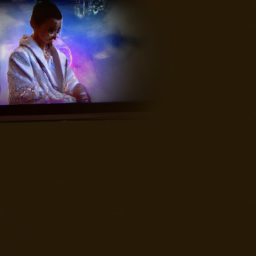The phrase “what dreams are made of” wraps around us like a warm embrace on a cold winter day, evoking feelings of wonder and comfort. It feels like standing in front of a vast landscape, with endless possibilities stretching out before us.
And when you add music to that phrase, it becomes an anthem for hope and inspiration. That’s why the song ‘What Dreams Are Made Of’ from the movie ‘The Lizzie McGuire Movie’ is so beloved by fans all over the world.
Its catchy melody and uplifting lyrics capture the essence of chasing after our dreams, no matter how big or small they may be. In this article, I’ll dive into the meaning behind this iconic song, its story, and how it has impacted both fans and critics alike.
So grab your headphones and let’s explore what makes ‘What Dreams Are Made Of’ such a special piece of music.
Key Takeaways
- The song ‘What Dreams Are Made Of’ is a beloved anthem for dreamers and believers that anything is possible.
- The lyrics of the song reflect on the songwriter’s own struggles and triumphs, making it a relatable and inspiring message for listeners.
- The song’s impact on Hilary Duff’s music career was significant, helping to launch her into superstardom and solidifying her status as a teen pop icon.
- Dream-related lyrics, like those in ‘What Dreams Are Made Of’, have the power to inspire hope, encourage self-reflection, and connect us on a deep emotional level.
The Meaning Behind the Phrase ‘What Dreams Are Made Of’
What’s in a dream? ‘What Dreams Are Made Of’ might just hold the answer.
This phrase has been around for centuries and has become ingrained in popular culture. Its origin can be traced back to Shakespeare’s play, The Tempest, where it was used to describe the magical powers of dreams.
The cultural significance of this phrase cannot be understated as it speaks to our innate desire for something beyond ourselves. Dreams have always represented hope and possibility, giving us a glimpse into what could be.
In literature, art, and music, they have been explored as a source of inspiration or escape from reality. In music, the popularity of the song ‘What Dreams Are Made Of’ by Hilary Duff is a testament to how deeply rooted this phrase is in our consciousness. It captures the essence of dreaming big and chasing after one’s aspirations.
The lyrics are an anthem for anyone who dares to dream and believe that anything is possible. As we delve into the meaning behind ‘what dreams are made of’, we see that it represents more than just a fleeting thought during sleep; it encompasses our deepest desires and aspirations.
The exploration of this phrase in various forms of media shows us that dreams are not only important but essential to living a fulfilling life.
The Popularity of the Song ‘What Dreams Are Made Of’
You’re surely aware of the sheer success and widespread sensation surrounding the song ‘What Dreams Are Made Of’. This track by Hilary Duff became an instant classic upon its release in 2003.
It was part of the soundtrack for the movie ‘The Lizzie McGuire Movie’ which starred Duff herself as the titular character. The song’s impact on pop culture cannot be overstated, as it introduced a new generation to Duff’s music and cemented her status as a teen idol.
The popularity of ‘What Dreams Are Made Of’ also marked an important turning point in Hilary Duff’s music career. Prior to this song, she had already released two albums that were primarily targeted at a younger audience. However, with this track, she was able to showcase her versatility and appeal to a wider demographic.
Its catchy melody and uplifting lyrics resonated with fans all over the world and helped launch Duff into mainstream success.
Looking back now, it is clear that ‘What Dreams Are Made Of’ has stood the test of time. It continues to be beloved by fans who grew up listening to it and has even earned a spot in pop culture history.
As we delve deeper into the story behind the song, we’ll see just how much thought and effort went into creating this timeless hit.
The Story Behind the Song
I find it fascinating to learn about the story behind the song ‘What Dreams Are Made Of’.
As a fan of ‘The Lizzie McGuire Movie’, I’ve always been curious about how this hit song was written and its connection to the film.
Through my research, I discovered some interesting facts that shed light on the creative process behind this iconic track.
How it was Written
When writing "What Dreams Are Made Of,"Lizzie McGuire’s theme song, I drew inspiration from my own experiences and emotions. The creative process was personal to me, and I reflected on the struggles and triumphs of my own life.
Here are three ways my personal experiences influenced the writing of this song:
-
I’ve always been driven by my own dreams and aspirations as a songwriter. In writing this song, I drew upon those same hopes and desires that have motivated me throughout my career.
-
Like Lizzie McGuire, I had to navigate the ups and downs of adolescence while pursuing my dreams. This song reflects not only the joy of accomplishment but also the struggles that come with chasing your dreams.
-
Ultimately, "What Dreams Are Made Of"is about more than just achieving your goals. It’s about connecting with others along the way. As Lizzie discovers in the movie, success is so much sweeter when you can share it with those you love.
My personal experiences helped me capture these themes in a way that resonated with audiences worldwide. An achievement that has brought me immense pride and satisfaction over the years. Its connection to "The Lizzie McGuire Movie"further solidified its impact on young people everywhere.
Its Connection to ‘The Lizzie McGuire Movie’
It’s funny how many people don’t realize that the catchy tune they’ve been singing along to for years is actually the theme song of one of their favorite childhood movies, ‘The Lizzie McGuire Movie.’ As a fan of the movie myself, I find it interesting to explore nostalgia and cultural impact through this connection. The film was released in 2003 and starred Hilary Duff as Lizzie McGuire, a teenage girl who goes on a school trip to Rome and ends up impersonating an Italian pop star. ‘What Dreams are Made Of’ plays during the climactic performance scene where Lizzie reveals her true identity.
To better understand the significance of this song, I created a table comparing its lyrics with some notable moments from the movie. Through this analysis, it becomes clear how well the song captures the themes and emotions of the film. For example, both Lizzie’s journey and ‘What Dreams are Made Of’ touch on topics such as self-discovery, adventure, and young love. Additionally, while some might dismiss this as just another cheesy Disney Channel movie from their childhoods, it’s important to acknowledge its lasting impact on popular culture. The film helped launch Hilary Duff’s career into superstardom and remains a beloved classic among fans today.
As we move into analyzing the lyrics of ‘What Dreams are Made Of,’ it’s worth remembering just how much influence media can have on our lives – especially when we’re young.
Analyzing the Lyrics
You can feel the intensity of the lyrics in ‘What Dreams Are Made Of’ as they paint a vivid picture of the desire and struggle to achieve your dreams. Analyzing the lyrics, you can see that it speaks to everyone who’s ever had a dream. The emotions conveyed through each line are powerful and relatable.
Here are some key takeaways from analyzing the lyrics:
-
The opening lines (‘Hey now, hey now, this is what dreams are made of’) immediately grab your attention and set the tone for the rest of the song.
-
The chorus (‘Have you ever seen such a beautiful night? / I could almost kiss the stars for shining so bright’) encapsulates the feeling of being on top of the world and achieving your dreams.
-
The second verse (‘Somehow we’ve always been together / But never got together’) speaks to missed opportunities and unrealized potential, which is something many people can relate to.
-
Finally, Lizzie’s declaration at the end (‘Hey now, hey now / This is what dreams are made of!’) emphasizes that no matter how difficult it may seem to achieve your dreams, it’s all worth it in the end.
The catchy melody and upbeat tempo complemented by Hilary Duff’s powerful vocals make ‘What Dreams Are Made Of’ an instant classic. As someone who appreciates good music with inspiring messages, I’m always moved by this song whenever I hear it. It reminds me that no matter how hard life gets or how far away my goals may seem, anything’s possible if I just keep pushing forward towards my dreams – something I believe many others can relate to as well.
The Catchy Melody and Upbeat Tempo
The infectious beat and lively rhythm of ‘What Dreams Are Made Of’ make it impossible to resist tapping your feet or bobbing your head along to the music, much like a blissful summer day where the sun’s warmth fills you with energy and joy.
As I listen to the song, I can’t help but notice how seamlessly the tempo and instrumentation come together. From the upbeat guitar strums to the catchy handclaps, every element of this track serves to create a fun and energetic atmosphere.
It’s no wonder that this song has had such an impact on pop culture since its release in 2003. It quickly became a fan favorite among audiences of all ages, cementing Hilary Duff’s status as a beloved teen icon. With its positive message about chasing one’s dreams and embracing new experiences, ‘What Dreams Are Made Of’ resonated with viewers long after they left the theater.
When I reflect on the significance of this song in ‘The Lizzie McGuire Movie,’ I’m struck by how well it captures the spirit of both Lizzie and her alter ego Isabella. Throughout the film, we see Lizzie struggle with feelings of insecurity as she navigates unfamiliar territory in Rome. But when she takes on Isabella’s persona on stage at a concert, she finally gets a taste of what it feels like to be confident and self-assured.
In many ways, ‘What Dreams Are Made Of’ is not just a catchy pop tune – it’s also an anthem for anyone who has ever felt unsure about themselves or their place in the world.
The Significance of the Song in ‘The Lizzie McGuire Movie’
As a fan of ‘The Lizzie McGuire Movie,’ I can’t help but appreciate how the song ‘What Dreams Are Made Of’ perfectly captures Lizzie’s journey towards self-discovery and confidence.
The song’s lyrics, combined with Hilary Duff’s powerful vocals, make it an anthem for young girls who are finding their way in the world. It speaks to the universal desire for acceptance and belonging that many teenagers feel.
The impact of this song on Hilary Duff’s career cannot be overstated. She was already well-known as a child actress, but her portrayal of Lizzie McGuire catapulted her to superstardom.
‘What Dreams Are Made Of’ showcased her vocal talent and cemented her status as a triple threat: singer, actress, and performer. The success of the song also helped to establish Duff as a pop culture icon in the 2000s.
The song’s influence on 2000s pop culture is undeniable. It became an instant classic among fans of the movie and spawned numerous covers and parodies online.
Even today, more than 15 years after its release, ‘What Dreams Are Made Of’ continues to resonate with audiences around the world. Its message of empowerment and self-confidence transcends time and has made it one of the most memorable songs from that era.
As we move into discussing the reception by fans and critics of this iconic tune, it is clear that ‘What Dreams Are Made Of’ holds a special place in many people’s hearts.
The Song’s Reception by Fans and Critics
Get ready to hear what fans and critics had to say about the unforgettable anthem from ‘The Lizzie McGuire Movie.’ ‘What Dreams Are Made Of’ was an instant hit with audiences, particularly young girls who identified with its empowering message. The song’s popularity helped solidify Hilary Duff’s status as a teen pop icon and further propelled her career in both music and acting.
Critics also praised the song for its catchy melody and upbeat lyrics that perfectly captured the film’s coming-of-age story. The song’s cultural relevance cannot be understated, as it continues to live on through social media memes, covers, and parodies.
Even years after its release, ‘What Dreams Are Made Of’ remains a beloved classic among fans of all ages.
Overall, the reception of ‘What Dreams Are Made Of’ by fans and critics has been overwhelmingly positive. Its impact on Hilary Duff’s career is undeniable, cementing her place as a pop culture icon of the early 2000s. Moreover, the song’s cultural relevance speaks to its enduring legacy that will continue to inspire future generations of dreamers around the world.
The Legacy of the Song
You can still hear the upbeat melody of ‘What Dreams Are Made Of’ on the radio today, reminding you of the endless possibilities that come with chasing your passions. The lasting impact of this song continues to inspire and motivate people around the world, years after its release.
From teenage girls belting out the lyrics in their bedrooms to adults reminiscing about their younger days, ‘What Dreams Are Made Of’ has become a cultural reference for many.
The legacy of this song goes beyond just its catchy tune and empowering lyrics. It also represents a time when Disney Channel was at its prime, producing iconic movies like The Lizzie McGuire Movie. For many fans who grew up watching Hilary Duff play Lizzie McGuire on their television screens, this song holds a special place in their hearts as it captures the essence of what made the show so beloved. It’s no wonder why ‘What Dreams Are Made Of’ has stood the test of time and remains a fan favorite.
While there have been other songs about dreams over the years, ‘What Dreams Are Made Of’ stands out for its ability to capture both youthful optimism and adult aspirations. Its timeless message reminds us that we should never give up on our dreams and always strive for self-improvement.
As we move forward into a new era of music, it’s important to remember classics like this that continue to shape our culture and inspire future generations.
Other Songs About Dreams
When it comes to songs about dreams, there are a plethora of options across different genres.
While ‘What Dreams Are Made Of’ by Hilary Duff is a catchy pop anthem with a positive message, other songs about dreams can differ in style and tone.
Some may explore the darker sides of dreaming or take on a more introspective approach.
Regardless of these differences, all these songs share the common theme of chasing after one’s aspirations and desires through the power of imagination.
Similarities and Differences to ‘What Dreams Are Made Of’
Although ‘What Dreams Are Made Of’ and its similarities and differences to other songs have been widely discussed, there’s no denying the unique charm that Lizzie McGuire’s iconic song brings to the table. Comparing themes and examining lyrics reveal that while there are similarities between ‘What Dreams Are Made Of’ and other songs about dreams, there are also distinct differences that set it apart.
One similarity is the emphasis on hope and ambition. ‘What Dreams Are Made Of’ encourages listeners to pursue their dreams with passion and determination, just like other songs about dreams such as ‘Dream On’ by Aerosmith.
Another common theme is overcoming obstacles in pursuit of one’s aspirations. In ‘What Dreams Are Made Of’, Lizzie sings about facing challenges but not giving up on her dream. Similarly, Katy Perry’s hit song ‘Roar’ also speaks of overcoming adversity on the path to success.
However, what sets ‘What Dreams Are Made Of’ apart from other songs about dreams is its lightheartedness and whimsical nature. The catchy melody, joyful tone, and playful lyrics make it a fun anthem for dreamers of all ages.
Additionally, unlike many other songs about dreams which focus solely on individual achievement, What Dreams Are Made Of includes a sense of community by encouraging listeners to support each other’s aspirations.
With these unique elements in mind, it’s clear why What Dreams Are Made Of has become such a beloved song over the years. Moving forward into examples from different genres…
Examples from Different Genres
As we’ve explored the similarities and differences between ‘What Dreams Are Made Of’ and other dream-related songs, it’s become clear that while there may be common themes and messages across genres, each song brings its own unique perspective to the concept of dreams.
From pop to rock to hip-hop, artists have found ways to incorporate the idea of dreaming into their music in creative and meaningful ways.
Exploring themes, lyrics, and messages across different genres can provide valuable insights into how dreams are perceived across cultures. Dream-related lyrics have been a staple in music for decades, with many songs having a profound cultural significance.
For example, Bob Marley’s ‘Three Little Birds’ speaks about not worrying because ‘every little thing is gonna be alright,’ a message that has resonated with people all over the world. The impact of dream-related lyrics in music cannot be understated – they have the power to inspire hope, encourage self-reflection, and connect us on a deep emotional level.
Frequently Asked Questions
Who wrote and composed the song ‘What Dreams Are Made Of’?
I discovered that the song ‘What Dreams Are Made Of’ was written and composed by singer-songwriter Hilary Duff. Its inspiration comes from her character’s journey in the movie ‘The Lizzie McGuire Movie.’ The music video features scenes from the film and showcases Duff’s energetic performance.
Did the song win any awards or receive any nominations?
Unfortunately, "What Dreams Are Made Of"didn’t win any awards or receive major nominations. However, it did receive positive critical reception for its catchy tune and upbeat lyrics.
What is the significance of the song’s placement in ‘The Lizzie McGuire Movie’?
It’s a strange coincidence that my childhood memories of ‘The Lizzie McGuire Movie’ are entwined with the song ‘What Dreams Are Made Of’. Exploring its cultural impact in the 2000s, it’s clear that the song’s placement in the film played a crucial role in its success. It not only helped to propel Hilary Duff’s music career but also became an iconic moment for fans of the movie.
Has the song been covered or sampled by any other artists?
I’ve researched and found that "What Dreams Are Made Of"has been covered by several artists, including KSM and Hilary Duff herself. There are also various interpretations, from being a song about following your dreams to a romantic ballad. Collaborations include a mashup with Taylor Swift’s "Love Story."
What impact did the song have on the career of the singer, Hilary Duff?
The song "What Dreams Are Made Of"had a significant impact on my career. It helped increase my fandom and cultural relevance, reaching a wider audience. Its success also paved the way for future projects and collaborations.
Conclusion
In conclusion, "What Dreams Are Made Of"is a song that captures the essence of chasing one’s aspirations and living life to the fullest. The lyrics are meaningful and inspiring, urging listeners to pursue their dreams and never give up. The catchy melody and upbeat tempo add to the uplifting message of the song, making it a fan favorite for years to come.
The legacy of "What Dreams Are Made Of"continues to live on as fans reminisce about its significance in "The Lizzie McGuire Movie."This timeless classic has inspired other artists to create similar songs about dreams, further cementing its lasting impact on pop culture.
Overall, "What Dreams Are Made Of"is an anthem for dreamers everywhere, reminding us all that with hard work, perseverance, and a little bit of luck, we can achieve anything we set our minds to.










